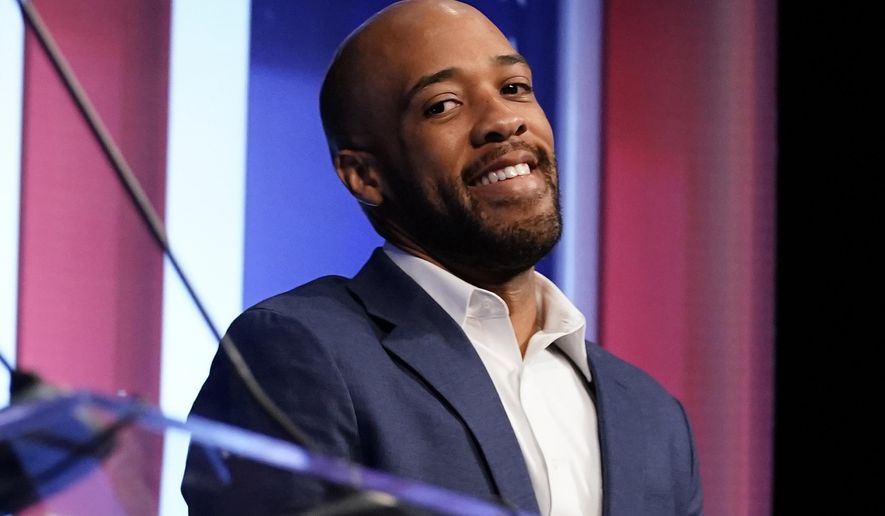MILWAUKEE — Standing beside the pulpit at King Solomon Missionary Baptist Church on a crisp fall Sunday morning, Democratic U.S. Senate candidate Mandela Barnes was preaching to the choir – they were assembled behind him, clad in blue and gold robes.
“This community is always top of mind for me,” he reassured the mostly older congregants filling the pews, as he hit on issues he knew they care about: crime, jobs, inflation.
It’s a typical strategy for any Democrat who wants to win in battleground Wisconsin – go to Milwaukee, speak in Black churches, pose for pictures with the churchgoers. And it’s a share of the electorate that should be especially fertile ground for Barnes, who grew up on Milwaukee’s mostly Black north side and first dipped his toe in politics as an organizer and later state representative there.
As Barnes, the state’s lieutenant governor, seeks to become Wisconsin’s first Black senator, his chances against two-term Sen. Ron Johnson may depend on how well he can connect with voters here who have not always turned out in big numbers.
“Our white population is split down the middle and minority voters will make the decision,” Reverend Greg Lewis, an influential organizer in Milwaukee’s Black community, said in an interview. “Whoever they vote for will win.”
Barnes knows most of the people at King Solomon are already in his corner, with some already turning in early votes for him. It’s not older, religious Black voters he needs to worry about mobilizing. It’s these congregants’ nieces, nephews, children and grandchildren that community organizers describe as a disaffected and disinterested generation.
“I’m asking you to help talk to some other people – some friends, some family, some neighbors. If we get five to 10 people out each, we can win this thing,” Barnes told the congregants.
For Barnes, whom polls show slightly behind Johnson in one of the handful of races that could shift Senate control, that means connecting with people like Joe Louis Gordon II.
Gordon, 32, met Barnes at a campaign event on Black maternal health in mid-October. As his girlfriend, Makoria Morrow, joined the discussion, Gordon sat to the side with their 2 1/2-month-old daughter and said he “didn’t know too much” about Barnes. He said he hadn’t voted since Barack Obama was running for president.
“Just like everyone else in the community, we really don’t really care about voting or care about the race or anything like that because we feel like our voice is not going to get heard anyways,” he said.
After seeing Barnes in person, Gordon said he planned to vote for him.
“I just felt something different to come and just meet him and just to see that he actually is a genuine human being. He’s just like us. He could be my neighbor,” Gordon said.
In the two weeks until Election Day, the Barnes campaign is doubling down on breaking through to young Black voters with events at Black student unions and elsewhere in the community. They’re also investing millions in reaching young voters of color on streaming platforms like YouTube and Spotify. Obama himself comes to town on Saturday for a rally at a north Milwaukee high school, part of a parade of national names who have visited to support Barnes.
“Mandela has run an aggressive campaign schedule to connect with Black voters in Milwaukee, and he’ll continue to do so through Election Day and beyond that,” said Barnes campaign spokesperson Maddy McDaniel.
Republicans aren’t conceding the votes. They opened their first office in the city’s downtown in 2020 in hopes of peeling away some of Democrats’ most loyal supporters. According to AP VoteCast, an expansive survey of more than 110,000 voters nationwide, 9 in 10 Black voters nationally backed Joe Biden in 2020.
For Michelle Wilkins, a 27-year-old doula who took part in the discussion on maternal health that Gordon attended, this election is the first time in a while she’s felt like her vote could make a difference. Barnes’ strong support for abortion rights and for Black mothers resonated with her, she said.
“We need someone to fight for African American people. And not just people, but women. And especially with the Roe versus Wade situation,” she said.
Older Black voters, like the aunts and grandmothers at King Solomon, said they planned to press their family members to vote. At a Barnes rally, Fannie Harris, 69, of Wauwatosa, spoke of the sacrifices of the Black suffrage movement in calling it a duty: “Our ancestors worked too hard for us to be able to vote,” she said.
Rep. Gwen Moore, who is Black and represents most of the city of Milwaukee, fretted that major issues of the moment - a pandemic, inflation, and rising crime - have put such stresses on many Black families that voting is on the back burner.
“When you’re concerned about survival, sometimes voting just doesn’t get prioritized,” she said.




Please read our comment policy before commenting.